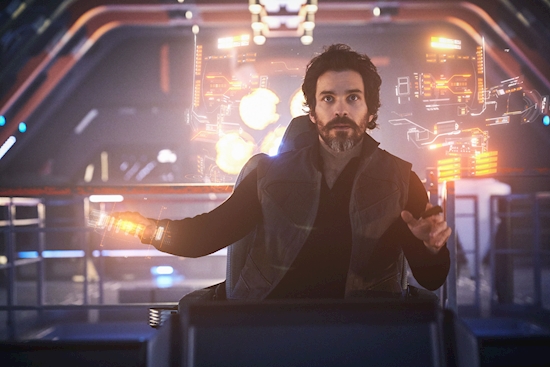Wil Wheaton Says Even Muggles Will Love 'Star Trek: Picard'
Wil Wheaton has a new enterprise. Wheaton, who played Wesley Crusher on Star Trek: The Next Generation, is now hosting a The Ready Room, a new aftershow for the CBS All Access series Star Trek: Picard. It was a chance to not only return to the franchise he’s been involved with for so many years, but also an opportunity to interview guests like Michael Chabon, who helped create the show, and Hanelle Culpepper, who directed the first episode.
“I had another 18 questions on cards that I wanted to ask them, that we just didn’t have time for,” Wheaton says in Episode 398 of the Geek’s Guide to the Galaxy podcast. “I could talk to them forever. I could easily go for an hour with every one of the guests. They’re just terrific.”
Podcast
The popularity of geek talk shows like The Ready Room has increased dramatically since 2014, when Wheaton’s show The Wil Wheaton Project was canceled by Syfy after one season. He gives much of the credit for the change to shows like the Walking Dead aftershow The Talking Dead.
While geek culture now dominates Hollywood, Wheaton realizes that not everyone shares his passion for Star Trek. He notes that his own wife, Anne Wheaton, does not enjoy Star Trek: The Next Generation. “I imagine the experience of watching Next Generation with me is not the best experience, because I talk through the whole thing,” he says. “Because everything triggers a memory.”
He’s optimistic, though, that Picard may be the show that finally converts his wife to Star Trek fandom, based on her reaction to the early episodes.
“I didn’t think my wife was going to like a science fiction show the way she loves Picard,” he says. “And that fills me with excitement for other people who are in mixed marriages—where they are the nerd and their wife or husband is the muggle. It makes me feel like this is a thing that they’re going to be able to share, and I think that’s really cool.”
Listen to the complete interview with Wil Wheaton in Episode 398 of Geek’s Guide to the Galaxy (above). And check out some highlights from the discussion below.
Wil Wheaton on narrating The Martian:
“For the audiobooks that I do, I insist on working with a director, and working at a studio that I’ve been creative partners with for years. Not every publisher wants to pay for a director, not every publisher wants to pay the fee to use the studio, and that’s absolutely their prerogative, I just won’t work with them. My director, her name is Gabrielle de Cuir, she and I have done incredible work together. We have won awards together, we’ve created bestselling audiobooks together, and it’s very much a collaboration. … I have found that being directed takes my performance from something that is competent to something that is really memorable and pretty special.”
Wil Wheaton on Cory Doctorow‘s writing advice:
“He emailed me back and he said, ‘I think you have some good ideas, but the form of this is actually pretty bad. Let me give you some examples.’ And he quoted a thing that I wrote, and he said, ‘All you’re doing here is telling, you’re not showing. Let me show you how to ‘show’ this.’ And he re-wrote a couple of sentences and pulled them out of the paragraphs, to show me how to show instead of tell. And then he used some examples from his own writing to inspire me, and help me on my path. And if he had not done that, I don’t think I ever would have had the confidence, and I don’t think I would have had the guidance that I needed, to start—in 2004—becoming the writer I am today.”
Wil Wheaton on Tabletop:
“It’s really important to me that I know the people who come and play on the show, because what makes Tabletop special—and what makes Tabletop different from some of the other extraordinary gameplay videos and gameplay series that are on—is that our show really is about the camaraderie and the gentle competition, and the fun that happens as people sit around a table to play a game together. … And to facilitate that, I need to have people I know, who I am friends with, who I would want to play games with, as much as possible. We did one episode where I didn’t know anybody, and it’s not one of my favorites, because it just felt awkward and weird.”
Wil Wheaton on Steve Jackson:
“Steve came in to play Munchkin, but he won Munchkin by cheating, which is incredible. He cheated and got away with it. Nobody saw it, nobody caught it. It is in the rules of Munchkin—it is an official rule—that if you cheat and get away with it, that’s fine. Which I think is a terrible rule! That is an awful rule. But Steve Jackson says, ‘Every game is a role-playing game.’ And in Munchkin you are an adventurer who is just trying to grab loot and screw your friends, and leave everybody else worse than you found them. And he was like, ‘I just leaned into that.’ … [So] Steve won by cheating, which I thought was really, really funny, and entirely appropriate for that game.”
More Great WIRED Stories
Source: www.wired.com

